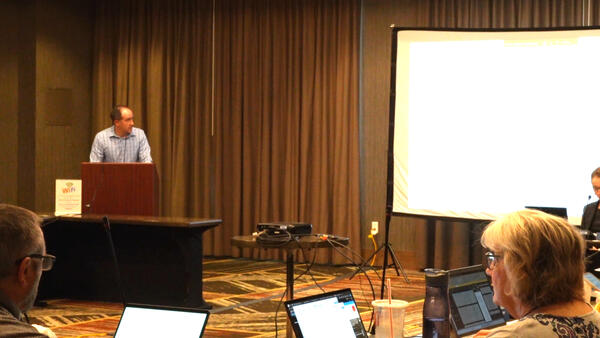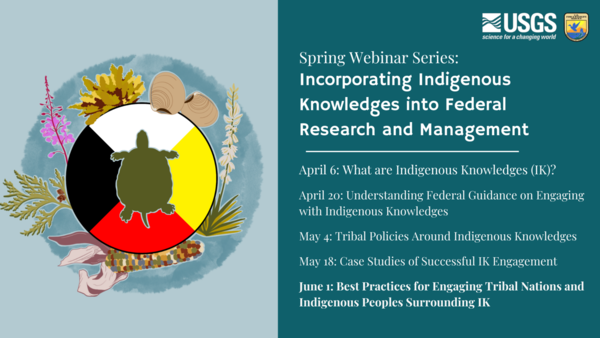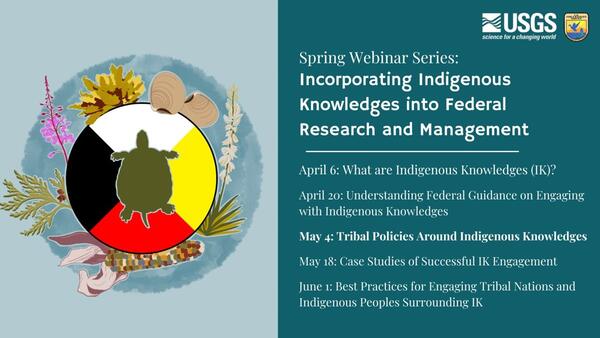In this webinar, speakers Elijah Johnson, Abigail Lynch, Olivia LeDee, and Cielo Sharkus discuss various ways and benefits to broadening participation in environmental science through fellowship programs.
Videos
Climate Champion Video Series
Meet CASC scientists through the USGS Climate Champions video series!
Explore interviews with our scientists, fieldwork videos, and recordings of National CASC-hosted webinars below.
 Broadening Participation in Environmental Science Through Fellowships
Broadening Participation in Environmental Science Through Fellowships
In this webinar, speakers Elijah Johnson, Abigail Lynch, Olivia LeDee, and Cielo Sharkus discuss various ways and benefits to broadening participation in environmental science through fellowship programs.
In partnership with the U.S. Fish and Wildlife Service National Conservation Training Center, the National CASC presents a webinar series on the intersection between climate and environmental justice and environmental research.
This webinar's speakers are:
In partnership with the U.S. Fish and Wildlife Service National Conservation Training Center, the National CASC presents a webinar series on the intersection between climate and environmental justice and environmental research.
This webinar's speakers are:
 Showcasing Regional Differences in Climate and Environmental Justice Applications
Showcasing Regional Differences in Climate and Environmental Justice Applications
In partnership with the U.S. Fish and Wildlife Service National Conservation Training Center, the National CASC presents a webinar series on the intersection between climate and environmental justice and environmental research.
This webinar's speakers are:
In partnership with the U.S. Fish and Wildlife Service National Conservation Training Center, the National CASC presents a webinar series on the intersection between climate and environmental justice and environmental research.
This webinar's speakers are:
Meet the 2022-2024 cohort of the Climate Adaptation Postdoctoral (CAP) Fellows Program, focused on “The Future of Aquatic Flows”!
Meet the 2022-2024 cohort of the Climate Adaptation Postdoctoral (CAP) Fellows Program, focused on “The Future of Aquatic Flows”!
 CAP Fellows Program: Coming Together as a Cohort (AD)
CAP Fellows Program: Coming Together as a Cohort (AD)
Meet the 2022-2024 cohort of the Climate Adaptation Postdoctoral (CAP) Fellows Program, focused on “The Future of Aquatic Flows”!
Meet the 2022-2024 cohort of the Climate Adaptation Postdoctoral (CAP) Fellows Program, focused on “The Future of Aquatic Flows”!
Megan Behnke is a Climate Adaptation Postdoctoral (CAP) fellow with the Alaska Climate Adaptation Science Center. Based out of the University of Alaska Southeast, her research explores how stream chemistry changes under new climate and stream conditions, and how these changes impact valuable fish species like salmon.
Megan Behnke is a Climate Adaptation Postdoctoral (CAP) fellow with the Alaska Climate Adaptation Science Center. Based out of the University of Alaska Southeast, her research explores how stream chemistry changes under new climate and stream conditions, and how these changes impact valuable fish species like salmon.
Megan Behnke is a Climate Adaptation Postdoctoral (CAP) fellow with the Alaska Climate Adaptation Science Center. Based out of the University of Alaska Southeast, her research explores how stream chemistry changes under new climate and stream conditions, and how these changes impact valuable fish species like salmon.
Megan Behnke is a Climate Adaptation Postdoctoral (CAP) fellow with the Alaska Climate Adaptation Science Center. Based out of the University of Alaska Southeast, her research explores how stream chemistry changes under new climate and stream conditions, and how these changes impact valuable fish species like salmon.
 Climate Adaptation Postdoctoral Fellows Program: Overview
Climate Adaptation Postdoctoral Fellows Program: Overview
Hosted by the USGS Climate Adaptation Science Centers (CASCs), the Climate Adaptation Postdoctoral (CAP) Fellows Program supports applied research at both national and regional scales. Each two-year fellowship cohort is centered around a common climate theme. The 2022-2024 cohort is themed “The Future of Aquatic Flows.”
Hosted by the USGS Climate Adaptation Science Centers (CASCs), the Climate Adaptation Postdoctoral (CAP) Fellows Program supports applied research at both national and regional scales. Each two-year fellowship cohort is centered around a common climate theme. The 2022-2024 cohort is themed “The Future of Aquatic Flows.”
 Climate Adaptation Postdoctoral Fellows Program: Overview (AD)
Climate Adaptation Postdoctoral Fellows Program: Overview (AD)
Hosted by the USGS Climate Adaptation Science Centers (CASCs), the Climate Adaptation Postdoctoral (CAP) Fellows Program supports applied research at both national and regional scales. Each two-year fellowship cohort is centered around a common climate theme. The 2022-2024 cohort is themed “The Future of Aquatic Flows.”
Hosted by the USGS Climate Adaptation Science Centers (CASCs), the Climate Adaptation Postdoctoral (CAP) Fellows Program supports applied research at both national and regional scales. Each two-year fellowship cohort is centered around a common climate theme. The 2022-2024 cohort is themed “The Future of Aquatic Flows.”
The Urban Climate Adaptation Virtual Symposium, a showcase of climate adaptation strategies and partnerships in urban and suburban ecosystems with an emphasis on environmental justice needs and collaborations, was held on April 4, 2024.
The Urban Climate Adaptation Virtual Symposium, a showcase of climate adaptation strategies and partnerships in urban and suburban ecosystems with an emphasis on environmental justice needs and collaborations, was held on April 4, 2024.
 Incorporating Climate and Environmental Justice into Research and Resource Management: Climate & Environmental Justice at the National Scale
Incorporating Climate and Environmental Justice into Research and Resource Management: Climate & Environmental Justice at the National Scale
Incorporating Climate and Environmental Justice into Research and Resource Management: Climate & Environmental Justice at the National Scale
linkIn partnership with the U.S. Fish and Wildlife Service National Conservation Training Center, the National CASC presents a webinar series on the intersection between climate and environmental justice and environmental research.
Incorporating Climate and Environmental Justice into Research and Resource Management: Climate & Environmental Justice at the National Scale
linkIn partnership with the U.S. Fish and Wildlife Service National Conservation Training Center, the National CASC presents a webinar series on the intersection between climate and environmental justice and environmental research.
 Incorporating Climate and Environmental Justice into Research and Resource Management: Skillsets & Competencies Integral to Justice Work
Incorporating Climate and Environmental Justice into Research and Resource Management: Skillsets & Competencies Integral to Justice Work
Incorporating Climate and Environmental Justice into Research and Resource Management: Skillsets & Competencies Integral to Justice Work
linkIn partnership with the U.S. Fish and Wildlife Service National Conservation Training Center, the National CASC presents a webinar series on the intersection between climate and environmental justice and environmental research.
Incorporating Climate and Environmental Justice into Research and Resource Management: Skillsets & Competencies Integral to Justice Work
linkIn partnership with the U.S. Fish and Wildlife Service National Conservation Training Center, the National CASC presents a webinar series on the intersection between climate and environmental justice and environmental research.
 A DOI employee presents in front of a federal working group
A DOI employee presents in front of a federal working group
Bill Stewert with the Bureau of Reclamation presents in front of the Glen Canyon Dam Adaptive Management Program (GCDAMP), a Federal Advisory Committee in the Colora
Bill Stewert with the Bureau of Reclamation presents in front of the Glen Canyon Dam Adaptive Management Program (GCDAMP), a Federal Advisory Committee in the Colora
Jeff Arnold with the National Park Service drives a motorboat down a stretch of the Colorado River near Lee's Ferry.
Video Description: A man with white hair and a beard wears an orange waterproof jacket as he steers a motorboat through red canyons.
Jeff Arnold with the National Park Service drives a motorboat down a stretch of the Colorado River near Lee's Ferry.
Video Description: A man with white hair and a beard wears an orange waterproof jacket as he steers a motorboat through red canyons.
U.S. Fish and Wildlife Service employee David Ward returns a fish to its tank in a fish lab in Flagstaff, Arizona.
Video Description: A tall man holds a fish by the mouth as he moves it from the net back into its grass-lined enclosure.
U.S. Fish and Wildlife Service employee David Ward returns a fish to its tank in a fish lab in Flagstaff, Arizona.
Video Description: A tall man holds a fish by the mouth as he moves it from the net back into its grass-lined enclosure.
Emily Nastase is a 2023 Science to Action Fellow based out of North Carolina State University. Her dissertation research focuses on the ecology and behaviors of the Henslow’s sparrow.
Emily Nastase is a 2023 Science to Action Fellow based out of North Carolina State University. Her dissertation research focuses on the ecology and behaviors of the Henslow’s sparrow.
Emily Nastase is a 2023 Science to Action Fellow based out of North Carolina State University. Her dissertation research focuses on the ecology and behaviors of the Henslow’s sparrow.
Emily Nastase is a 2023 Science to Action Fellow based out of North Carolina State University. Her dissertation research focuses on the ecology and behaviors of the Henslow’s sparrow.
 Diverse Knowledge Systems and Science to Action Fellowships
Diverse Knowledge Systems and Science to Action Fellowships
A webinar presented by Dr. Abigail Lynch to provide information to those interested in applying to the Diverse Knowledge Systems and Science to Action Fellowships through the USGS National Climate Adaptation Science Center.
A webinar presented by Dr. Abigail Lynch to provide information to those interested in applying to the Diverse Knowledge Systems and Science to Action Fellowships through the USGS National Climate Adaptation Science Center.
 Incorporating Indigenous Knowledges into Federal Research and Management: Best Practices for Engaging Tribal Nations and Indigenous Peoples Surrounding Indigenous Knowledges
Incorporating Indigenous Knowledges into Federal Research and Management: Best Practices for Engaging Tribal Nations and Indigenous Peoples Surrounding Indigenous Knowledges
Incorporating Indigenous Knowledges into Federal Research and Management: Best Practices for Engaging Tribal Nations and Indigenous Peoples Surrounding Indigenous Knowledges
linkIn November 2022, the White House Office of Science and Policy released guidance on how Federal agencies can ethically acknowledge and incorporate Indigenous Knowledges (IK) into science, management, and decision-making.
Incorporating Indigenous Knowledges into Federal Research and Management: Best Practices for Engaging Tribal Nations and Indigenous Peoples Surrounding Indigenous Knowledges
linkIn November 2022, the White House Office of Science and Policy released guidance on how Federal agencies can ethically acknowledge and incorporate Indigenous Knowledges (IK) into science, management, and decision-making.
 Incorporating Indigenous Knowledges into Federal Research and Management: Tribal Policies around Indigenous Knowledges
Incorporating Indigenous Knowledges into Federal Research and Management: Tribal Policies around Indigenous Knowledges
Incorporating Indigenous Knowledges into Federal Research and Management: Tribal Policies around Indigenous Knowledges
linkIn November 2022, the White House Office of Science and Policy released guidance on how Federal agencies can ethically acknowledge and incorporate Indigenous Knowledges (IK) into science, management, and decision making.
Incorporating Indigenous Knowledges into Federal Research and Management: Tribal Policies around Indigenous Knowledges
linkIn November 2022, the White House Office of Science and Policy released guidance on how Federal agencies can ethically acknowledge and incorporate Indigenous Knowledges (IK) into science, management, and decision making.
 Incorporating Indigenous Knowledges into Federal Research and Management: Understanding the New White House Guidance on Indigenous Knowledges
Incorporating Indigenous Knowledges into Federal Research and Management: Understanding the New White House Guidance on Indigenous Knowledges
Incorporating Indigenous Knowledges into Federal Research and Management: Understanding the New White House Guidance on Indigenous Knowledges
linkIn November 2022, the White House Office of Science and Policy released guidance on how Federal agencies can ethically acknowledge and incorporate Indigenous Knowledges (IK) into science, management, and decision making.
Incorporating Indigenous Knowledges into Federal Research and Management: Understanding the New White House Guidance on Indigenous Knowledges
linkIn November 2022, the White House Office of Science and Policy released guidance on how Federal agencies can ethically acknowledge and incorporate Indigenous Knowledges (IK) into science, management, and decision making.






